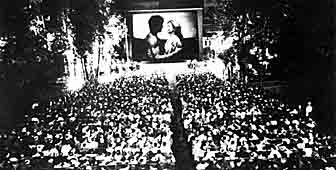Locarno: the smallest of the big festivals

The history of Locarno's international film festival has seen more twists and turns than a Hitchcock plot.
Last year the festival drew 175,000 movie fans and more than 4,400 industry professionals. But the “smallest of the big festivals”, as it likes to call itself, hasn’t always attracted as much attention. Even its birth has been described as an accident.
In 1941, the neighbouring town of Lugano decided to follow Venice’s example and began showing open-air films. But the experiment lasted only a few years until the local population turned its back on the idea of a permanent screen in the town.
The decision presented the citizens of Locarno with an opportunity that they grabbed with both hands, setting up their own screen in the gardens of local luxury hotel. And in August 1946, the town’s film festival was born, beating Cannes by a few months.
The early years saw the event struggle to carve out a niche for itself. Dreams of making a mark on the international stage were plagued by financial difficulties. For eight years, the federal authorities refused to consider the festival an event of national importance.
To become a fully-fledged festival, Locarno also needed a competition. But film distributors were fiercely opposed to the idea, and it wasn’t until 1958, after a number of unsuccessful attempts, that an official competition was launched.
Cold War blows in
Political considerations also shaped the festival’s development. When the film critic Vinicio Beretta was hired as the event’s secretary in 1953, he didn’t hesitate to programme films from eastern Europe, from the Soviet Union and Czechoslovakia.
Locarno quickly earned itself a reputation as a hotbed of communism, especially in Switzerland’s German-language press.
Beretta used the launch of the official competition to showcase young film-makers and to show off his own personal discoveries. Over the next 12 years, his successors went even further, showing films that catered less for the tastes of the general public and more for film buffs.
The Golden Leopard award finally made its appearance at the festival in 1968, the same year as the event left the gardens of the Grand Hotel and moved into local theatres.
Three years later, the festival took its movies back out into the open air – a decision that has influenced its activities ever since. For the first time, films were shown on the Piazza Grande, Locarno’s main square.
The move coincided with the appointment of Swiss film-maker Moritz de Hadeln – later director of the Berlin film festival – as festival director. De Hadeln began by seriously upgrading the event’s organisation and attempting to strike a better balance between mainstream and independent films.
Controversial screenings
However, his spell in the hot seat came to an abrupt end in 1976 following uproar over the screenings of two controversial films: Oshima’s “Empire of the Senses” and Pasolini’s “120 days of Sodom”.
It was not until the eighties, under the directorship of editor and art collector Raimondo Rezzonico and then David Streiff, that Locarno’s reputation was cemented.
Streiff programmed more retrospectives, invited more films from countries less well known for their movie production, such Iran or China, and launched the Leopards of tomorrow for short films in 1991. During this period, the average number of spectators rose from 40,000 to 100,000.
Italy’s Marco Müller took over from Streiff in 1992, bringing a truly commercial flavour to the festival by creating a proper movie market. He also gave more weight to Asian cinema and modified some of the festival’s structures, before leaving in 2000.
In 2001, Irene Bignardi, a journalist from Milan, took over as festival director, in tandem with a new president, Marco Solari, the former head of canton Ticino’s tourism office.
Last year’s record numbers saw Bignardi raise the festival to new heights. “Perhaps I’m less of an intellectual, even if I am one,” she says laughing. “I like movies that speak to people.”
by Bernard Léchot

In compliance with the JTI standards
More: SWI swissinfo.ch certified by the Journalism Trust Initiative








You can find an overview of ongoing debates with our journalists here . Please join us!
If you want to start a conversation about a topic raised in this article or want to report factual errors, email us at english@swissinfo.ch.